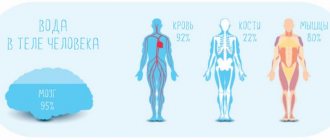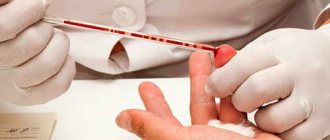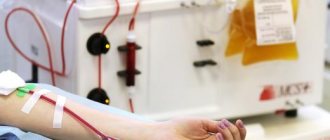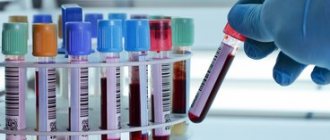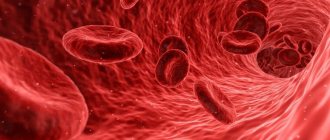Myths about donation: is it harmful or beneficial to donate blood?
Myth 1: Donating blood is bad for your health.
Truth: The average amount of blood circulating in the body of an adult is 4000 ml. It has been proven that the periodic loss of 12% of this volume not only does not have a negative effect on health, but also works as a kind of training that activates hematopoiesis and stimulates resistance to stress.
The volume of a one-time donation of donor blood does not exceed 500 ml (of which about 40 ml is taken for the purpose of testing). The body quickly replaces blood loss without any negative consequences.
Myth 2: Donating blood is painful and tedious.
Truth: The donor's discomfort is reduced to immediate pain at the moment the needle is inserted. The further procedure is absolutely painless. Donating whole blood takes about a quarter of an hour. After its completion, the donor may experience slight fatigue, so on the day of the procedure it is not recommended to engage in heavy physical labor or go on a long trip. Donating blood components (plasma, platelets or red blood cells) can take up to one and a half hours.
Myth 3: There is a risk of donor infection
Truth: For blood collection, only disposable instruments and devices are used, which are unpacked in the presence of the donor, and after the procedure they are immediately disposed of.
Myth 4: The need for donor blood is small
Truth: Blood transfusions are needed for patients undergoing complex surgical operations, women in labor with complicated labor, and people with severe injuries or burns. Donor blood and its components are used in the treatment of leukemia and other oncological diseases. According to statistics, every third person on our planet needs a blood or plasma transfusion at least once in their life.
To fully provide the healthcare system with the required amount of blood, 40-50 people out of 1000 must be donors.
Myth 5: The donor needs to eat more heavily
Truth: One day before donating blood, you should not eat fatty foods, dairy, meat, eggs, smoked meats, chocolate, bananas, canned food and fast food.
It is better to donate blood in the first half of the day. Before the procedure, you need to get a good night's sleep, have breakfast, preferring porridge or pastries and sweet tea. After donating blood, you should eat a balanced diet and remember to drink plenty of fluids to replace blood loss.
Myth 6: Donating blood causes weight gain
Truth: There is a risk of becoming fat for those people who, having misunderstood the nutrition recommendations, begin to intensively consume high-calorie foods to donate blood and cannot stop in time.
Myth 7: Donation is bad for your appearance
Truth: Some women fear that donating blood will worsen their complexion and skin elasticity. In fact, regular donation activates the work of the hematopoietic organs, causes the blood to renew itself faster, and has a beneficial effect on the functioning of the immune, cardiovascular and digestive systems. Donors, as a rule, do not have problems with the tone and color of their skin. They are cheerful, fit, active and have a positive attitude.
Regular blood donation teaches the body to quickly replenish blood loss, which can play a positive role in the event of an injury or illness from which no one is immune. It has been clinically proven that donation reduces the risk of developing cardiovascular pathologies. Some men note that regular blood donation has a positive effect on potency.
Myth 8: Donor and recipient must be of the same nationality
TRUTH: Nothing like that! The compatibility of the donor and the recipient (the person to whom the blood is transfused) depends solely on the composition of the blood, that is, the presence or absence of certain proteins in it. For transfusion, the compatibility of blood groups (AB0 system) and Rh factor is important. These indicators are distributed almost equally among different races and ethnic groups. With a suitable protein composition, donor blood can be transfused to the recipient regardless of gender, age or nationality.
Myth 9: Together with the blood from the donor, you will take on your character
Truth: A blood transfusion does not add any of the donor's personal qualities or abilities to the recipient. It can only aggravate health problems if an unscrupulous donor allowed himself to donate blood without giving up bad habits. But not because information supposedly encrypted in the blood will be transmitted, but because breakdown products of nicotine, alcohol and other toxins that can cause harm to health can enter the recipient’s bloodstream.
What is the benefit for the donor?
Regular donation of donor blood provides a person with the prevention of diseases of the immune system caused by metabolic disorders: gout, atherosclerosis, problems with the pancreas, stomach and liver. Researchers have also proven that systematically donating blood for transfusion to patients reduces the likelihood of cardiovascular pathologies, since excess blood and its components gradually puts a greater strain on the blood vessels and heart.
Another bonus is that the donor undergoes free diagnostics before blood donation, according to the website: www.medbooking.com.
Such people are not accepted as donors
In addition to obvious reasons such as infection with hepatitis, HIV or tuberculosis, blood diseases, cancer, you will be denied if you:
3 pregnant woman (blood will be accepted no earlier than one year after giving birth);
3 nursing mother (you can become a donor three months after the end of lactation);
3 had the flu or ARVI less than a month ago;
3 to ten days ago underwent dental surgery;
3 were treated with acupuncture or had a tattoo (piercing) less than a year ago;
3 have recently been vaccinated.
Men can donate blood no more than five times a year, and women - four times a year.
Two days before the procedure, the donor must give up alcoholic beverages. You should refrain from smoking for at least an hour before blood collection. Three days before the procedure, you must stop taking medications that reduce blood clotting (including aspirin and painkillers).
Health
Good health at the time of blood donation.
You should not donate blood if you have a cold, flu, sore throat, herpes, upset stomach or any other infection.
You cannot donate blood for 6 months after getting a tattoo or piercing. If the piercing was performed by a registered healthcare professional and there is no inflammation, you can donate blood after 12 hours.
After visiting the dentist for a minor procedure, you can donate blood within 24 hours; After significant interventions, you must wait a month.
You cannot donate blood if your hemoglobin levels are below the minimum level established for blood donation:
- A test is performed at the blood donation site. In many countries, minimum hemoglobin levels are 12.0 g/dL for women and 13.0 g/dL for men.
"No one is safe"
Murad Ibragimov is a future dentist. He is finishing his fifth year and preparing to enter residency.
“The first time I donated blood was in my first year. At first I joined the Nadezhda donor squad as a volunteer. I liked the movement and became interested. Since then, I have been donating blood during every campaign for four years now,” says Murad.
The young man actively encourages his acquaintances and friends to become donors.
“Life is such a thing that no one is immune from the fact that an accident will happen to their relatives or loved ones when they need a blood transfusion. This needs to be realized. Almost all of my classmates and acquaintances were donors or tried to become one. Sometimes there are exceptions - low hemoglobin or other indications. But everyone tried, and everyone wanted. And many succeeded,” says Murad Ibragimov.
Myths and legends about blood giving
In addition to objective reasons, potential donors are stopped by irrational fears.
“One of the persistent myths is that a donor at a blood service facility can become infected with any diseases that are transmitted by blood. This is absolutely impossible. Disposable consumables are used during the procedure. They simply physically cannot be reused. In addition, the staff regularly changes gloves and undergoes a medical examination,” says Olga Mayorova.
Another popular fear is the fear of going to the procedure early in the morning on an empty stomach. However, donors, on the contrary, must have breakfast before the procedure. The morning meal, however, should be very light, containing mainly carbohydrates. This could be porridge with water, fruit, tea with cookies. No dairy or fatty foods.
The popular fear of fainting is certainly justified. However, with proper actions, the risks are minimal.
“If you feel the slightest discomfort, you should immediately contact medical personnel. It is important to rest after donation. You don't have to rush to work right away. You need to sit quietly for 15–20 minutes, drink water, tea or juice, and only after that go about your business,” says Olga Mayorova.
Three stages of verification
The new coronavirus infection has not been studied enough, so specialists are not just collecting biomaterial, but also studying how donors suffered the disease and checking the amount of antibodies using various methods.
“We are trying, by finding out the history, to find out exactly how the disease progressed, and to weed out people who suffered it too easily, practically without noticing. The fact is that not all people react the same way to this infection and everyone produces antibodies differently . For example, if a person has had a temperature above 38 degrees for three or more days, then most likely this will be associated with a more pronounced production of antibodies. And if the virus remains on the first line of defense of the immune system, then there will not be a large number of antibodies. We want to collect plasma rich in antibodies,” explains Alexander Kostin.
Those who have recovered from coronavirus are tested for antibody levels using various ELISA methods to different viral proteins.
“We come to the conclusion that the simultaneous presence of both IgG and IgM in the donor is important. Based on a combination of indicators, a decision is made: which donor is more suitable. We are still establishing a clear threshold value for the level of detected antibodies. But even after the donor has donated plasma and it is potentially ready for clinical use, we are waiting for a test from the Gamaleya Institute, where the presence of virus-neutralizing antibodies is most accurately confirmed,” adds Alexander Kostin.
Potential donors are those whose blood contains both types of antibodies - IgG and IgM. The presence of these indicators is a sufficient reason to try to get selected, even if you have not “officially” been sick and antibodies were detected as a result of screening at the clinic. Already at the blood donation point, the donor will undergo a clarifying additional analysis to determine the value of the plasma.
The initial survey is conducted by the call center. Then the medical institution contacts the potential donor. Based on the results of the conversation, a decision is made whether or not to invite a specific person to donate plasma.
Now the system of working with donors is being restructured into a three-stage system. First, a conversation on the phone, then initial tests at a medical facility, and only then, the next day, a person who has recovered from coronavirus is invited to donate plasma. This scheme allows sampling only from those whose plasma is truly rich in antibodies and can really help in treating the disease.
On the basis of the Research Institute of Emergency Medicine named after N.V. Sklifosovsky opened a hospital for follow-up treatment of patients with coronavirusFighting coronavirus: how the laboratory of the Research Institute of Emergency Medicine named after N.V. works. Sklifosovsky
Save at least two
Patients hospitalized in metropolitan medical organizations with a new coronavirus infection undergo 15–20 transfusions of convalescent plasma daily. These data are provided by the head of the department of clinical and industrial transfusiology and gravitational blood surgery of the Research Institute of Emergency Medicine named after N.V. Sklifosovsky Alexander Kostin.
“Some people need one transfusion, others need two, rarely three transfusions,” he says.
One donor donates 600–650 milliliters of plasma. This dose is divided into two or three parts and can help two to three patients. You can donate blood plasma two weeks after complete recovery.
Donors who have a good immune response can repeat the procedure again after two weeks.
Hospital No. 52 accepts plasma donors for the treatment of coronavirusBlood donors with antibodies to COVID-19 will receive incentive payments

